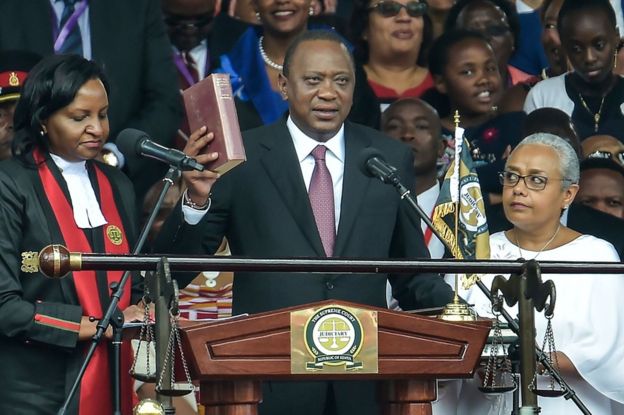
Raila Odinga says he wants to create “a proper democracy” in Kenya
Kenya’s main opposition leader, Raila Odinga, has declared himself the “people’s president” at a controversial “swearing-in” ceremony in the capital.
Thousands of his supporters attended the event, despite a government warning that it amounted to treason.
The authorities shut down TV stations to prevent live coverage of the event.
President Uhuru Kenyatta was sworn in for a second term last November. He won an election re-run in October, but Mr Odinga boycotted it.
Elections were first held in August but the courts ordered a re-run, saying Mr Kenyatta’s victory was marred by irregularities.
Holding a Bible in his right hand at a park in Nairobi, Mr Odinga declared that he was answering to a “high[er] calling to assume the office of the people’s president of the Republic of Kenya”.
People had had enough of election rigging and the event was a step towards establishing a proper democracy in the East African state, Mr Odinga told a cheering crowd.
Speaking earlier to Kenyan broadcaster KTN, Mr Odinga said his “swearing-in” was intended to “show the world that what we are doing is legal, constitutional and not something you can remotely describe as a coup”.
What did he achieve?
It was a public relations stunt that ended in disappointment for many opposition supporters, says the BBC’s Alastair Leithead in Nairobi.
Mr Odinga turned up for just 20 minutes. He signed a statement, swore an oath and left the stage, leaving his supporters wondering why it was such a low-key affair, he adds.
His deputy, Kalonzo Musyoka, was not at the event, and Mr Odinga said Mr Musyoka would be “sworn-in” at a later date.
However, his absence suggested there were divisions in Mr Odinga’s National Super Alliance, our correspondent says.
What do Odinga supporters say?
One of them, Larry Oyugi, said there was nothing illegal about Tuesday’s event: “We have warned the police enough and we are also going as per the constitution. The constitution of Kenya, article one, allows all Kenyans to exercise their power directly.
“This is why we are here to exercise our powers by gathering here and also article 37 allows peaceful assembly. We are citizens of this country, we are allowed to peacefully assemble here and elect our president as per the constitution.”
Police allowed the event to take place, despite warning earlier that they would prevent it from going ahead.
How did the TV ban take hold?
Three privately owned television stations – NTV, KTN and Citizen TV – went off air from around 09:10 (06:10 GMT), BBC Monitoring reports.
Citizen TV told the BBC the authorities had forced them off the air over plans to cover the gathering.
It live streamed the event on its website, and on YouTube and Facebook.
KTN viewers watched their screens fade to black as the news presenter read a statement confirming that the national communications authority was switching off transmission.
Switching off the broadcasting signals of media organisations is unusual in Kenya, the BBC’s Anne Soy reports from Nairobi.
Threats have been made in the past and some media groups have been raided but none have had their signal deliberately disrupted.
Kenyan journalists have denounced the move as outrageous and in a statement called for “respect of the constitution” and an end to the “unprecedented intimidation of journalists”.
There was tension in Kenya on Tuesday as some schools closed in the capital because of the event, and people did not know what to expect, our correspondent says.
Why is the election result disputed?

Mr Kenyatta was inaugurated for a second term in November
Mr Kenyatta was officially re-elected with 98% of the vote on 26 October but just under 39% of voters turned out. He was inaugurated in November.
His victory is not recognised by Mr Odinga, who argues he was elected by a small section of the country.
Mr Kenyatta also won the original election on 8 August but that result was annulled by the Supreme Court, which described it as “neither transparent nor verifiable”.
When the repeat vote was called, Mr Odinga urged his supporters to shun it because he said no reforms had been made to the electoral commission.
Correspondents say the election dispute has left Kenya deeply divided. About 50 people are reported to have been killed in violence since the August ballot.
Source: BBC























